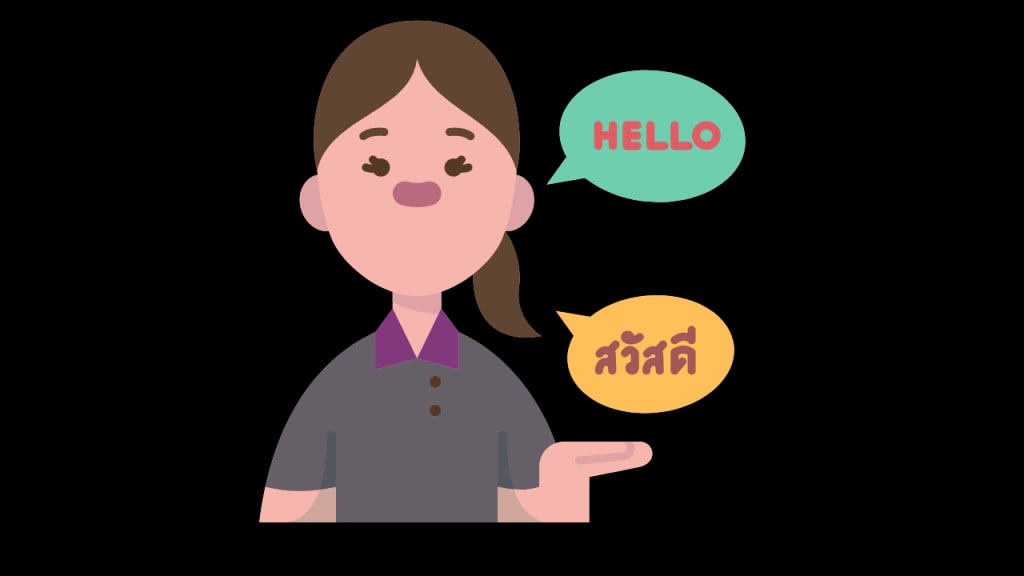The 15 Extraordinary Benefits Of Bilingualism
As global citizens, it's important to learn to speak at least one other language.

Bilingualism is one of the most exciting and rewarding endeavours in which to take part. More often than not, you'll find that bilinguals have a greater ability to solve problems on their own terms, are better equipped for understanding other viewpoints, and often have stronger memories.
Bilingualism also has many significant health benefits for children who grow up learning two languages. For example, it has been shown that bilingual children are better able to compensate for cognitive deficits following a stroke or traumatic brain injury (TBI). Bilingualism helps with recovery from TBI by preventing even more neurological damage from occurring due to the language differences between English and Spanish.
Here are 15 benefits of bilingualism
1. Improved memory
In one study, it was found that bilinguals performed just as well as their monolingual counterparts on tests involving aural and visual stimuli. What this means is that the bilingual brain is capable of more complex forms of mental manipulation, and can visualize unseen concepts just as easily as a monolingual brain can. Because of this, bilinguals have better memories overall than their monolingual counterparts.
2. Better at solving problems and thinking abstractly
Because they are more likely to consider multiple solutions to problems than monolinguals, bilinguals develop superior problem-solving skills over time. Not only that, but they are also better able to think about abstract concepts and ideas. This is because bilingual people often have to use their brains to translate between two different languages.
3. Stronger attention span
One of the biggest benefits of bilingualism has to do with attention span, which is often seen as a crucial component in the development of children who are predisposed to ADD or ADHD behaviours. It has been found by psychologists that having two languages makes it easier for children to focus on specific things. Further studies conducted on this subject have shown it is particularly beneficial for women who are bilingual, and can help them pay more attention at work and be less forgetful or distracted than women who speak only one language.
4. Better memory recall
The ability to remember things from one language to another helps bilinguals organize their memories in a way that is much more efficient. Bilingual children are also better able to recall things from their past, and do better in class.
This is due to the fact that they can quickly pull up the knowledge they learned before in a different language. One way bilinguals are able to do this is by thinking about how a word sounds when they hear it, or how it might move their tongue or lips when they think about saying it.
Instead of learning words like "cat" and "dog" separately, bilingual children will often focus on how both words look like when they think about the word "cat. This makes it much easier to remember how to say the word when they think of it again.
5. Better at multitasking
Another benefit is that bilinguals are better at multitasking than their monolingual counterparts are. Not only do they have the ability to listen and pay attention, but their brains can also be processing other things. This comes in handy in everyday life, as you never know what might come your way and what kind of tasks you'll need to accomplish at the same time.
This doesn't mean that bilinguals are worse at focusing on singular tasks of one language either: so long as they have learned a second language before their brain develops, then it will retain this ability for life.
6. Better at understanding sentiments
Bilingual brains are capable of understanding and recognizing emotions from one language to another. Because of this, bilingual children are often better at reading facial expressions and body language than their monolingual counterparts. This translates into them being better actors and knowing how to respond appropriately in different situations.
For example, a bilingual child may be able to understand that the expression on his friend's face means he is sad or upset, when his monolingual friend doesn't even realize he is unhappy himself. This can be very important in terms of social skills and communication between people who speak different languages as well.
7. Better English vocabulary
From an early age, bilingual children are able to retain their English vocabulary better than monolinguals. They have the ability to understand the grammar of their native language and express themselves in a way that is most efficient for them. Frequently, because bilinguals are used to thinking about how two different languages work together, they become more familiar with how English works as well.
This means that they can begin thinking about how words from other languages typically take on certain syllables or sounds in certain places like Spanish or French do. With this knowledge, it makes it easier for them to produce words in the correct places when reading or writing in English.
8. More outgoing
Bilingual children are more outgoing than their monolingual peers, because they are more accustomed to dealing with different people and cultures. This can also be advantageous for them in the classroom, as they have the ability to speak up and ask questions without feeling as anxious about speaking up in front of a large group. They are also better at paying attention to what other people are saying and interacting with them accordingly.
9. Improved performance on standardized tests
There has been research that suggests that children who grow up in bilingual or multilingual households will perform better on standardized tests than their monolingual counterparts. This is because these children have had to learn how to pay attention, focus, and solve problems in different ways than they would if they were monolingual.
10. Better at sports
Bilingual children who learn to play sports in their second language by using both English and Spanish words to describe the same movement will have the ability to remember these movements much more easily. This means that when it comes time for a game or for practice, bilingual children are able to think about what their bodies need to do instead of becoming lost in thoughts about how many words there are for every sport move. Additionally, this can also be beneficial later on in life, as bilingual people are also better at performing other complicated movements.
11. Easier to learn new languages
Bilinguals are better at learning new languages than their monolingual counterparts. This is because they are able to learn more quickly and correctly in their second language, due to the fact that their brains have already been conditioned by learning the first language. On top of this, they retain the knowledge they gained in their first language much better than those who are only taught one single language throughout their entire life.
12. They can listen better
The ability to listen attentively and follow directions is something that both bilingual children and adults develop as they get older and learn more about life. The unique way that bilingual brains handle both languages means that it will be easier for them to listen to instructions and directions, while also understanding what they say. They are also better at hearing conversations as well as noises in their surrounding environment.
13. Better at math
It is widely known that math is much easier for bilinguals than monolinguals are, because their brains have already been conditioned by learning two different languages simultaneously. This makes it possible for them to remember more facts and the order of things they learned in school, if they should ever want to test themselves on these subjects again. This can come very handy in the workplace or wherever there are numbers or equations involved in daily tasks and work.
14. They pay attention better
This is a very common ability that bilinguals have as children, but it becomes more evident as they get older. The way that their two different languages work together to give them the ability to understand two different things at the same time means that their brains are able to focus better and pay attention to both in order to solve problems. This makes them much more capable at paying attention in different places, such as being able to follow directions, reading something quickly, and being a well-rounded individual overall.
15. They are better multitaskers
While monolinguals have a harder time understanding and being coordinated when there is more going on in a given situation, bilingual people are much better able to handle multiple conversations and tasks at once. This is because of their ability to differentiate between their two different languages and think about two different things at once, allowing them to switch between them more quickly than monolinguals do.
Conclusion
Being bilingual has many benefits for children, but it is also very hard to learn as an adult. Even if you were fluent in two different languages as a child, it is much harder for you to pick them both up again when youve been using just English all of your life.
If you want to ensure that your child is able to grow up speaking two languages and learning about the world in two different ways, it may be best to start early out of the gate. There are many services available at school or even online that can help foster your childs bilingual development. It can be one of the most rewarding things you do for yourselves as parents and your children in the process.
About the Creator
BingBingMoney
Welcome to our blog... This is where we will find news, information, tips, tricks and advice on how to make your life better. We hope you enjoy our blog as much as we do.
Enjoyed the story? Support the Creator.
Subscribe for free to receive all their stories in your feed. You could also pledge your support or give them a one-off tip, letting them know you appreciate their work.






Comments
There are no comments for this story
Be the first to respond and start the conversation.